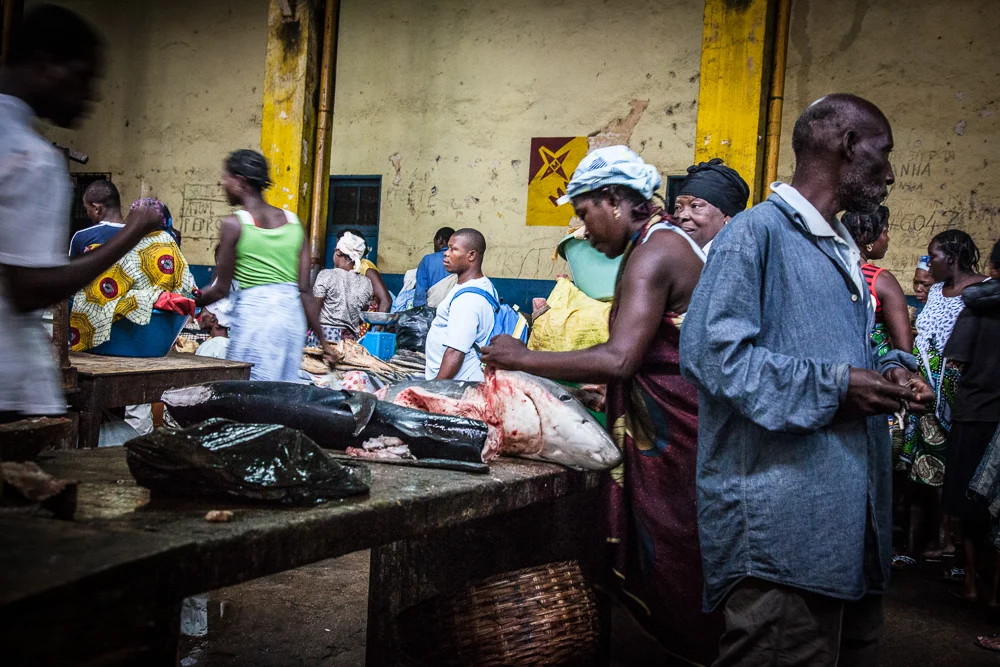The EU's proposed Fishing Authorisation Regulation - or FAR, does not include transparency on beneficial ownership. This is disappointing, particularly given the EU's commitment to providing public access to information on beneficial ownership of all EU registered companies through its directive on anti-money laundering. Here CFFA argues that the EU's Fisheries Committee ought to include this aspect to the FAR, which would put the EU at the forefront of global efforts to address criminal and unethical behaviours in fisheries.
Are the EU’s fisheries agreements helping to develop African fisheries?
A significant proportion of EU funds used for Sustainable Fisheries Partnership Agreements is earmarked for sectoral support - helping to develop sustainable fisheries in partner countries. However, analysis on the effectiveness of this sectoral support suggest considerable improvements are needed. Here we review the problems and offer our ideas on how the EU can make things better.
Improving sustainability through an ambitious revision of the Fishing Authorisation Regulation
Since the new Common Fisheries Policy (CFP) entered into force on January 1st 2014, there have been improvements registered in Sustainable Fisheries Partnership Agreements. However, tide still needs to turn as regards vessels fishing outside the framework of SFPAs.
Indeed, the EU external fleet counts around 700 vessels, but only 245 vessels fished under SFPAs in 2014: Several hundreds of EU vessels operate outside SFPAs, negotiating private agreements with third countries (this is only allowed when there is no SFPA between the EU and the particular country in place), or setting up chartering arrangements for their vessels with local businesses. Unfortunately, there is currently no way to have information about these arrangements.
This may change in the next months with a review of the so-called ‘Fishing Authorisation Regulation’ (FAR). This regulation will stipulate ‘eligibility criteria’, - designed to ensure transparency and sustainability- , that any EU vessel wanting to operate in external waters will have to fulfill to obtain a fishing authorisation from the EU Member State in which it is registered.
The proposal for a future FAR Regulation is currently being examined by the European Parliament and the Council. However, the European Economic and Social Committee (EESC), has already given its opinion on the matter. The EESC considers it necessary for the European Commission to verify the validity of the authorisations given by the Member State, checking whether the eligibility criteria have been duly applied.
In this article, CFFA explores why the European Commission should indeed verify what Member States do. Looking in particular at the case of Italy, we highlight that some EU countries tend to turn a blind eye to what their vessels are doing once they fish outside EU waters, thereby failing to fulfill their responsibilities as flag State under international law. Italy has consistently delivered fishing authorisations for all these vessels to fish in West Africa regardless of the fact that they shouldn’t be fishing there or that they were involved in illegal fishing.
This shows that if the EU is to ensure, through its Fishing Authorisation Regulation, that all its fishing vessels fishing outside EU waters respect “the same principles and standards as those applicable under Union law in the area of the CFP” as required by the new CFP, the European Commission has to play a key role to verify that all EU member states apply sustainability criteria rigorously before allowing their vessels to fish in third countries waters.
Is 1 in 4 fish stolen in Africa?
A new study commissioned by the African Union is intended to further our understanding on the costs of IUU fishing in Africa. This is important as existing claims about the scale and economic impact of IUU fishing are unreliable, and these are being used to call for increased resources for law enforcement and harsher treatment for criminals - without any consideration about the unintended consequences for workers and fishers. However, the methods used for this new study are limited, relying heavily on perceptions. More serious research is therefore needed to provide more balanced policy discussions.
Issues of the new EU-Mauritania fishing agreement protocol: small pelagics, bycatch and sectoral support
On March 22d, the European Parliament Fisheries Committee discussed the new EU-Mauritania fishing agreement protocol. Most parliamentarians, like the rapporteur, Mr Mato, see positively the protocol proposed. However, the issue of the absence of a regional framework for the sustainable management of small pelagics was raised by Mrs Rodust, who insisted the EU should promote such regional management.
CFFA fully shares this point of view. With regard to access to small pelagic through the Mauritania – EU SFPA, our greatest concern in terms of sustainability remains the fact that access is allocated to foreign fleets, including those of the EU and Russia, in the absence of a necessary regional management framework for these species, shared between, mainly, Morocco, Mauritania and Senegal. How is it possible to determine a surplus in the absence of such regional management?
The SRFC Convention on the Minimum Access Conditions (CMA), ratified by SRFC Member States, including Mauritania, call for a concerted management of small pelagic species in the region, and this call has been also made by local fishing communities, given the strategic importance of these resources for the food security of the entire region. This is a matter of urgency, given the state of full exploitation, or even over-exploitation of the round sardinella.
We therefore request the EU to make all possible efforts to promote such regional management, including through its SFPA dialogue with the concerned countries: Mauritania, Morocco, Senegal.
CFFA has additional comments about the EU-Mauritania new proposed protocol, concerning :
Mauritania commitment to Transparency
The Article 1 of the new Protocol stipulates that Mauritania undertakes to make public any public or private agreement allowing access to its EEZ by foreign vessels. This is an important positive step, which is rightly reflected by the rapporteur, Mr Mato. We hope that Mauritania will soon publish all these agreements, as it is for us a fundamental part of the implementation of the agreement, which will be examined at the occasion the first SFPA Joint Committee meeting, which will meet probably in May 2016.
Access to resources: by-catches of octopus and small pelagics
The state of the octopus resources in Mauritania remains a concern. The 2015-2019 Mauritania fisheries sector development strategy document insists on the fact that 'despite a recovery observed recently, the state of octopus stock is still a concern with overexploitation levels estimated to be at 17%’. In this context, it is to be welcome that there is no direct access for European fleets to this overexploited resource, which is key for the local artisanal sector.
However, if there is no access to the octopus as a target species through the SFPA, octopus remains one of species caught as bycatch: European shrimp trawlers may retain on board 8% of catches of cephalopods, composed mainly of octopus.
The rapporteur also underlines that Mauritania had undertaken to consider, during the first Joint Committee meeting, the possible allocation of new fishing opportunities for demersal freezer trawlers, which would then also include by-catches of octopus.
We feel that the impact of octopus by catches combined volumes on the state of the stock must be taken into account, and no further access should be given that would have a detrimental impact on the state of non-targeted resources, particularly the over exploited octopus.
The problem of bycatch is also present in the small pelagic fishery. For pelagic super trawlers, the joint Scientific Committee in 2013 made the hypothesis that there was possible under-reporting of by-catches, 'taking into account the practice of pelagic trawling which in general has a high bycatch rate with an important diversity of species caught as by-catch (over 100 species)'. The recent Maritime Atlas of vulnerable sea areas in Mauritania, published by the Mauritanian Institute of oceanographic research and fisheries (IMROP) states that, for the small pelagic fishery, 'while catches of the target species are well-regulated, the bycatch is a major problem’.
Efforts of selectivity are therefore needed to reduce by-catch of pelagic super trawlers, including by introducing, through the implementation of the 2015-2019 SFPA, the use of selectivity devices.
Sectoral support
During the last protocols, the sectoral support substantially decreased, from 16 million euros per year (2008-2012) to 3 million per year (2012-2014). It will be 4 million euros per year in the new protocol 2015-2019. So far, the use of sectoral support is very unsatisfactory for both parties: the funds were mainly used to cover running costs, rather than infrastructure, essential for the development of the sector. The question of transparency regarding the use of this sectoral support was also raised many times in the past.
To address these deficiencies, it is expected in the new protocol that sectoral support will be handled by an ‘execution cell’ that will coordinate the implementation with the beneficiaries of the selected projects. A report at the end of project will be published, which will consider the impact on resources, employment, investments. An annual workshop with beneficiaries will be held to present progress.
The rapid implementation of this transparent and participative approach should be encouraged, to improve the use of sectoral support funds to the benefits of Mauritanian sustainable fisheries development.
European Court of Auditor's report on the management EU Fisheries Partnership Agreements: comments and recommendations
The conclusions drawn by the Court’s report need to be deepened and broadened, since they are based only on four agreements and mostly reflect the concerns of the EU ship owners. Little consideration is given by the Court to civil society and third countries fishing communities’ interests and needs.
Strengthening Political Rights in Fisheries: The Importance of the Bali Guidelines
Political rights need to be at the forefront of reform efforts in fisheries, although they are often forgotten. In this blog we explain why the Bali Guidelines, established in 2010 and based on Europe's Aarhus Convention, offer a powerful reference point for fisheries policy debates. However, very few organisations involved in fisheries seem to be aware of these guidelines and are therefore not involved in international efforts for their implementation. 2016 should be the year that changes.




